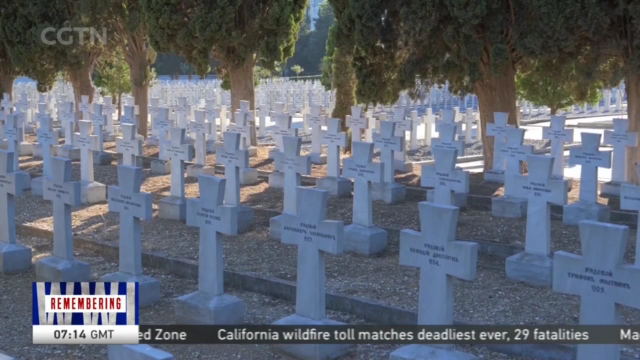
16:04, 12-Nov-2018
WWI 100th Anniversary: How the Great War ended on the Salonica Front
Updated
15:22, 15-Nov-2018
04:00

The First World War was called The Great War and the War to End All Wars. But it didn't. It also brought devastation to large parts of Europe, death to over 15 million people, and the collapse of three empires. World War One started in the Balkans. And according to many historians and historical documents, it wasn't decided at the Western Front, but by the strong push of the Serbian army supported by the Allied forces at the Southern, so-called Salonica Front. CGTN's Aljosa Milenkovic went to Thessaloniki in Greece and he brings from there a different angle about the war's end.
Serbian school children traveled hundreds of kilometers over two borders to pay their respects to their forefathers and to learn something about their glorious past.
This is Zeitenlik, an Allied military cemetery, the final resting place of nearly 22,000 soldiers who died in the Salonica campaign. Almost 8,000 of them were Serbian.
It is Just a fraction of all lives lost there.
Ninety-one-year-old Serb Đorđe Mihailović is the third and last generation of cemetery keepers from his family.
Both Đorđe's grandfather and father are buried here, and so will Đorđe, when the time comes.
Till then, he proudly does maintenance at this site that many Serbs and Greeks regard as sacred.
ALJOSA MILENKOVIC THESSALONIKI "This is Thessaloniki. A town in the Northern Greece. A birthplace of a song which was allegedly written by a Serbian soldier to his Greek girlfriend before he was sent to the front, just north of this city."
It was Georgios Dalaras who made this song world famous.
"Do not be angry with me, my dearest, now that I am going away from you."
"Let me see you, let me say goodbye. Open your window, my golden basil, my princess, and with a sweet smile, wish me a good night."
Over 1.2 million Serbs, 28% of the entire population, died in the war. Many perished in the 1916 battle for Kajmakcalan. The peak rises over 2.500 meters high on the border between Greece and then occupied Serbia.
It took a lot of time and a 21st Century SUV to help us reach the top.
ALJOSA MILENKOVIC KAJMAKČALAN "You can just imagine how it was back in 1916 when thousands of Serbian troops stormed uphill to this peak. At the end, thousands of them perished, but they were successful in liberating first square meters of their homeland."
It was a prelude to a massive breakthrough led by Serbian soldiers in September 1918 on the Salonica front.
As a result, the Bulgarian army capitulated, and the German troops were crushed by the vastly outnumbered Serbians.
PROFESSOR MILE BJELAJAC INSTITUTE OF RECENT HISTORY OF SERBIA "There is one famous telegram, written in anger by German emperor Wilhelm the Second and sent to his Bulgarian counterpart Coburg, saying: 'Shame! Sixty-two thousand Serbian soldiers decided the outcome of the war.' I think it is the greatest recognition of the Serbian Army, its commanders and the Allies which supported them."
Bulgaria and the Austro-Hungarian Empire collapsed, and Germany was forced to seek peace at the Western Front.
According to many historians, 100 years after, popular culture and the western-dominated narrative resulted in the near obliteration of the achievements and bravery of a small Serbian Army that brought two mighty empires and three emperors to their knees.
Aljosa Milenkovic, CGTN, Thessaloniki.

SITEMAP
Copyright © 2018 CGTN. Beijing ICP prepared NO.16065310-3
Copyright © 2018 CGTN. Beijing ICP prepared NO.16065310-3